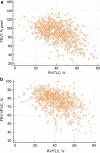Asthma in elderly is characterized by increased sputum neutrophils, lower airway caliber variability and air trapping
- PMID: 33441106
- PMCID: PMC7805110
- DOI: 10.1186/s12931-021-01619-w
Asthma in elderly is characterized by increased sputum neutrophils, lower airway caliber variability and air trapping
Abstract
Background: Elderly asthmatics represent an important group that is often excluded from clinical studies. In this study we wanted to present characteristics of asthmatics older than 70 years old as compared to younger patients.
Methods: We conducted a retrospective analysis on a series of 758 asthmatics subdivided in three groups: lower than 40, between 40 and 70 and older than 70. All the patients who had a successful sputum induction were included in the study.
Results: Older patients had a higher Body Mass Index, had less active smokers and were more often treated with Long Acting anti-Muscarinic Agents. We found a significant increase in sputum neutrophil counts with ageing. There was no significant difference in blood inflammatory cell counts whatever the age group. Forced expiratory volume in one second (FEV1) and FEV1/FVC values were significantly lower in elderly who had lower bronchial hyperresponsiveness and signs of air trapping. We found a lower occurrence of the allergic component in advanced ages. Asthmatics older than 70 years old had later onset of the disease and a significant longer disease duration.
Conclusion: Our study highlights that asthmatics older than 70 years old have higher bronchial neutrophilic inflammation, a poorer lung function, signs of air trapping and lower airway variability. The role of immunosenescence inducing chronic low-grade inflammation in this asthma subtype remains to be elucidated.
Keywords: Aging; Air trapping; Airway caliber; Asthma; Eosinophils; Hyperresponsiveness; Neutrophils; Sputum.
Conflict of interest statement
The authors declare that they have no competing interests related to this manuscript. Renaud Louis received grants from GSK, Astrazeneca, Novartis and Chiesi and personal fees from GSK, Astrazeneca and Novartis. Florence Schleich received grants from GSK and Astrazeneca and personal fees from GSK and Chiesi. Other co-authors have nothing to declare.
Figures



References
-
- Sohn K-H, Song W-J, Park J-S, Park H-W, Kim T-B, Park C-S, et al. Riskfactors for acute exacerbations in elderlyasthma: whatmakesasthma in olderadults distinctive? AllergyAsthmaImmunolRes. 2020;12:443–453. - PubMed
-
- Tessier JF, Nejjari C, Barberger-Gateau P, Dartigues JF. The epidemiology of asthma in the elderly. Apropos of a review of the literature. RevMalRespir. 1993;10:423–431. - PubMed
-
- Nejjari C, Tessier JF, Barberger-Gateau P, Jacqmin H, Dartigues JF, Salamon R. Functionalstatus of elderly people treated for asthma-relatedsymptoms: a population based case-control study. EurRespir J. 1994;7:1077–1083. - PubMed
-
- Varricchi G, Bencivenga L, Poto R, Pecoraro A, Shamji M, Rengo G. The emergingrole of T follicularhelper (TFH) cells in aging: influence on the immune frailty. AgeingResRev. 2020;61:101071. - PubMed
-
- Franceschi C, Garagnani P, Parini P, Giuliani C, Santoro A. Inflammaging: a new immune–metabolicviewpoint for age-relateddiseases. Nat RevEndocrinol. 2018;14:576–590. - PubMed
MeSH terms
Substances
Grants and funding
LinkOut - more resources
Full Text Sources
Other Literature Sources
Medical

